of Admissions, p. 153), and was called to the bar in due course. From 1625 to 1631 he reported cases in the court of king's bench (Hargrave MSS. 38–9; Lansdowne MS. 1083, f. 356; a note on f. 1 of the last-named manuscript states that he was appointed king's reporter by privy seal in 1617, but this is a mistake). In November 1631 he became recorder of Berwick, where he addressed a speech of loyal welcome to Charles I on 2 June 1633 (Scott, Berwick-upon-Tweed, p. 200; Rushworth, ii. i. 179). In 1634 he married Frances, daughter of Ferdinando Fairfax, afterwards second baron Fairfax [q. v.], an alliance which doubtless helped to bring him into prominence some years later (Addit. MS. 29670, f. 137 b). He was appointed recorder of York in 1638, and there again it was his duty, on 30 March 1639, to bid the king welcome. His speech on that occasion, though fulsome and extravagant, seems to have pleased the royal taste, for he was knighted two days later (Rushworth,ii. ii. 886; Drake, Eboracum, pp. 368, 136–7; Metcalfe, Book of Knights, p. 194). In the same year he became an ancient and bencher of Gray's Inn, and was Lent reader there in 1641; in November 1641 he was elected treasurer (Douthwaite, Gray's Inn, 1886, p. 71; Dugdale, Orig. Jurid. 1680, pp. 297, 299).
He was returned M.P. for Berwick on 11 March, and again on 3 Oct. 1640 (Members of Parliament, i. 482, 491). Though never prominent in debate, he was frequently employed by the Long parliament in committees and conferences, for which he was well fitted by his legal knowledge. He drew up the articles of impeachment against Bishop Wren, and laid them before the lords on 20 July 1641, with ‘a smart, aggravating speech’ (Rushworth, iii. i. 350; Parl. Hist. ii. 861, 886). On 18 Aug. 1645 he took the chair when the house resolved itself into a grand committee for reviewing the propositions to the king (Commons' Journals; Cal. State Papers, Dom., 1645–7, p. 64). He was sent as a parliamentary commissioner to the army on 12 June 1647 (Whitelocke, pp. 252–253). On 15 March 1648 he was appointed a commissioner of the great seal (ib. p. 295). On 12 Oct. he was raised to the degree of serjeant-at-law and made one of the king's serjeants (ib. p. 342; Commons' Journals). He ‘had no great mind to sit in the House of Commons’ after ‘Pride's Purge,’ and seems to have absented himself for some weeks; but Cromwell consulted him, together with Bulstrode Whitelocke [q. v.] and William Lenthall [q. v.], upon the state of affairs, on 18 and 21 Dec. Widdrington and Whitelocke spent all the next day in attempting to frame a satisfactory scheme, and on the 23rd they took part in a fruitless conference at the speaker's house. On the 26th they were both summoned to the committee for the king's trial; but they withdrew to Whitelocke's house in the country, and did not return to the house until 9 Jan. (Whitelocke, pp. 360–5, 367).
When the great seal of Charles I was replaced by that of the parliament on 8 Feb. 1649, Widdrington retired from the commission, pleading ill health and ‘some scruples in conscience;’ the house showed its appreciation by voting him a quarter's salary more than was due to him, and by entitling him to practise within the bar (ib. p. 378). He was appointed serjeant for the Commonwealth on 6 June 1650, and a member of the council of state on 10 Feb. 1651 (Commons' Journals). At a meeting convened by Cromwell on 10 Dec. 1651 to discuss the settlement of the nation, he advocated some form of monarchy, suggesting the Duke of Gloucester as king; and at the conference held in Whitehall on 19 April 1653, he spoke strongly against the impending dissolution of the Long parliament (Whitelocke, pp. 516, 554). He had been put on the militia commission for Yorkshire on 28 Aug. 1651, and he served on various committees during the Commonwealth and protectorate, e.g. trade and navigation, distressed protestants in Piedmont, and Durham College (Cal. State Papers, Dom. 1651 p. 381, 1655–6 pp. 1, 100, 218). Cromwell made him once more a commissioner of the great seal on 4 April 1654 (ib. 1654, p. 73), but dismissed him, 6 June 1655, upon his refusal to execute the ordinance for reforming the court of chancery. He remained, however, until 1659 on the treasury commission, to which he had been appointed in August 1654 (Whitelocke, pp. 621, 625–7; Cal. State Papers, Dom. 1654 p. 284, 1655 p. 362, 1656–7 p. 19, 1658–9 pp. 23, 323; Hist. MSS. Comm. 8th Rep. App. pp. 94, 95), and in 1655 he also became chancellor of the county palatine of Durham (Deputy-Keeper of Publ. Rec. 5th Rep. App. ii. 253). He represented York in the parliament of 1654, and was re-elected in 1656, but preferred instead to sit for Northumberland, and was chosen as speaker on 17 Sept. 1656 (Parl. Hist. iii. 1432, 1484; Commons' Journals, 1 Oct. 1656). He was so ill in the following January that he had to be carried into the house in a sedan-chair, and the house at first adjourned for some days, and afterwards appointed Whitelocke to take the chair during his absence, 27 Jan.–18 Feb. (Burton, Diary, i. 337, 369, 375; White-
